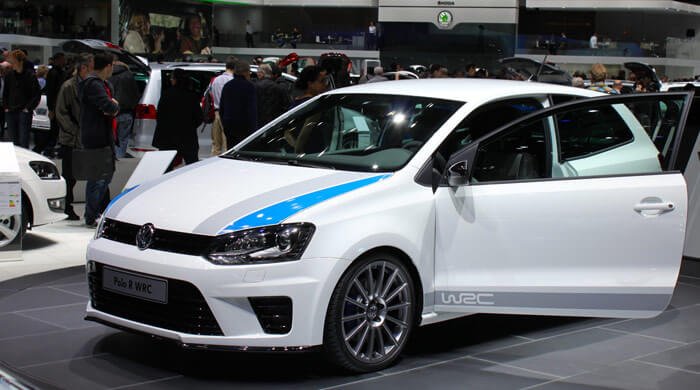Volkswagen, Mercedes, Audi, and BMW were the top-selling carmakers in Germany during the first six months of 2013.
The first half of 2013 saw the German car market contract by 8.1% to just over a million and a half new passenger vehicle registrations. Volkswagen easily remained the strongest car producer in Germany with more than a fifth of the new car market. VW was followed by Mercedes-Benz, Audi and BMW. The VW Golf remained Germany’s favorite car model while electric cars still do not sell in any significant numbers in Europe’s largest car market.
The German Car Market in 2013 (First Half)
The German car (PKW) market shrunk by 8.1% in January to June 2013 compared to the first six months of 2012. In total, Germany saw 1,502,630 new passenger vehicle registrations during the first half of 2013. With the exception of April 2013, car sales in Germany were lower every month of 2013 compared to the year before.
The total powered vehicle market in Germany during the first six months of 2013 was 1,756,867 (-8%) units. Electric vehicles took a 0.2% market share.
Best-Selling Car Brands in Germany in 2013 (Half Year)
The top-selling car marques in Germany during the first six months of 2013 according to car sales statistics released by the KBA were:
| Manufacturers | First Half/2013 | % Market Share | % Change | |
| 1 | VW | 324,948 | 21.6 | -9.0 |
| 2 | Mercedes | 141,719 | 9.4 | -2.3 |
| 3 | Audi | 128,249 | 8.5 | -5.1 |
| 4 | BMW | 118,840 | 7.9 | -7.1 |
| 5 | Opel | 105,587 | 7.0 | -11.0 |
| 6 | Ford | 98,851 | 6.6 | -11.8 |
| 7 | Skoda | 77,380 | 5.1 | -1.0 |
| 8 | Hyundai | 51,105 | 3.4 | -3.2 |
| 9 | Renault | 48,911 | 3.3 | -12.3 |
| 10 | Seat | 41,359 | 2.8 | 30.4 |
| 11 | Fiat | 37,378 | 2.5 | -8.5 |
| 12 | Toyota | 36,241 | 2.4 | -15.0 |
| 13 | Kia | 29,041 | 1.9 | 4.8 |
| 14 | Peugeot | 27,812 | 1.9 | -31.2 |
| 15 | Citroen | 26,377 | 1.8 | -24.9 |
| 16 | Nissan | 26,267 | 1.7 | -23.6 |
| 17 | Dacia | 23,481 | 1.6 | 8.4 |
| 18 | Mazda | 23,329 | 1.6 | 2.7 |
| 19 | Mini | 18,025 | 1.2 | -8.7 |
| 20 | Smart | 15,194 | 1.0 | -4.3 |
| 21 | Volvo | 14,639 | 1.0 | -18.1 |
| 22 | Chevrolet | 13,349 | 0.9 | -17.0 |
| 23 | Suzuki | 12,987 | 0.9 | -23.4 |
| 24 | Honda | 12,015 | 0.8 | -3.9 |
| 25 | Porsche | 11,849 | 0.8 | 3.0 |
| 26 | Mitsubishi | 11,133 | 0.7 | -14.5 |
| 27 | Land Rover | 6,912 | 0.5 | 21.1 |
| 28 | Subaru | 4,737 | 0.3 | 5.4 |
| 29 | Jeep | 3,031 | 0.2 | -9.6 |
| 30 | Jaguar | 2,236 | 0.1 | 35.0 |
| 31 | Alfa Romeo | 1,863 | 0.1 | -58.0 |
| 32 | Lancia | 776 | 0.1 | -59.5 |
| 33 | Lexus | 723 | 0.0 | -53.0 |
| Others | 6,286 | 0.4 | ||
| Total Car Sales | 1,502,630 | 100.0 | -8.1 |
NOTE:
- % Change compare January to June of respective years
- Position changes compare January to June 2013 to full year 2012
Best-Selling Car Marques in Germany in 2013 (Half Year)
It was mostly red ink for carmakers in Germany during the first half of 2013. Volkswagen narrowly underperformed the broader market but easily remained the market leader.
Mercedes and Audi leapfrogged BMW largely due to BMW and Mini statistics being split from 2013 onwards. Although all three so-called premium brands saw lower sales, all three outperformed the wider market confirming that German car buyers may be buying fewer but not necessarily cheaper cars.
Opel and Ford both underperformed the market and swapped ranks again with both marques struggling.
VW-owned Skoda became the most popular imported car brand in Germany during the first six months of 2013. Skoda and Kia outsold Renault, which dropped two places with the weakest performance of the top-ten carmakers.
VW-owned Seat entered the top-ten list, up from fifteenth last year, with very aggressive advertising and pricing in Germany. Seat was the most improved of all the larger brands.
Toyota was struggling again and fell out of the top ten in Germany during the first half of 2013.
The Volkswagen Golf easily maintained its position as Germany’s favorite car model. The Golf is now in its seventh generation and held the top spot in Germany since 1980.

